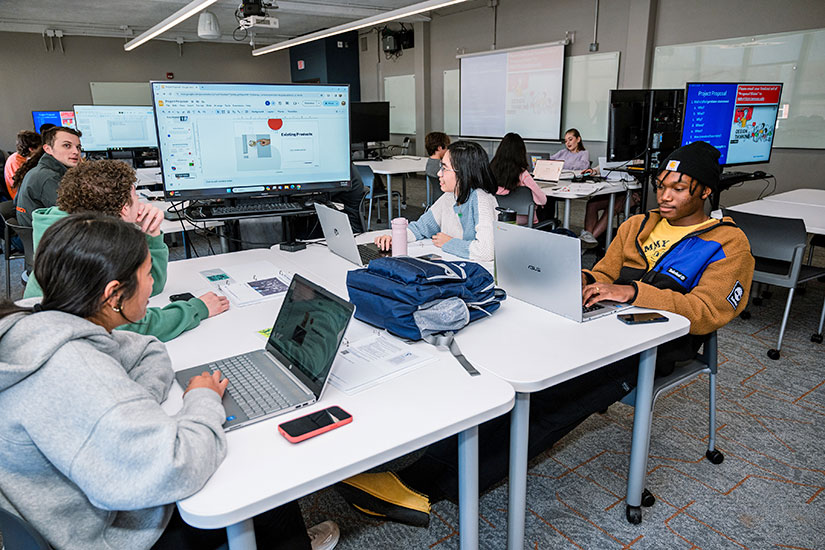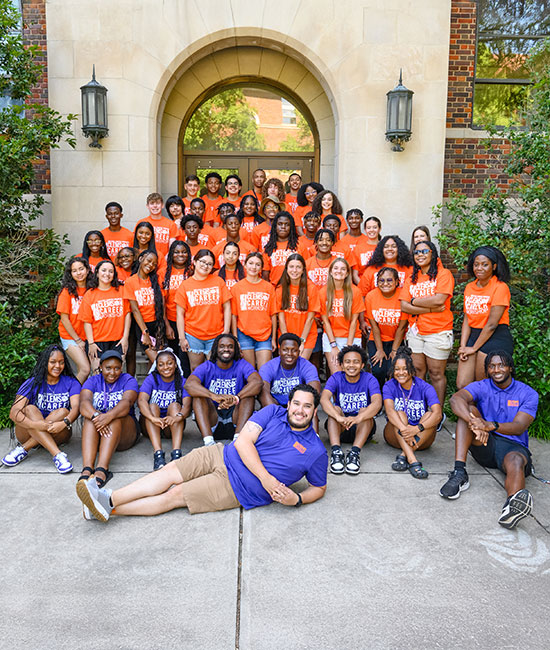Parent Tips to Prepare for College

Start the College Conversation Early
Preparing your child for college is a journey that requires thoughtful planning and guidance. With so many factors to consider, including when to begin preparation, a clear direction to help navigate this process is important. We've compiled essential tips to ensure your child is well-prepared when college application season arrives.
Below, you'll discover valuable insights on a comprehensive range of topics, from early career exploration and summer programs to SAT preparation and college campus visits.

Summer Opportunities That Make a Difference
Talk with your students about career options and where they might see themselves after high school. These conversations help young people begin connecting their interests and strengths to potential career paths. To further support this exploration, Clemson University offers several impactful summer programs designed specifically for middle and high school students.
Summer Scholars
Every summer, the Summer Scholars program at Clemson University welcomes hundreds of campers from 7th-12th grade who enjoy a one-week introduction to a variety of university learning options. From laboratory tours, class projects, and planetarium visits to games on Bowman Field and cookouts at the lake, students will be immersed in our campus culture.
Clemson Career Workshop
For a longer summer program, the Clemson Career Workshop is a two-year tracked program (through graduation) that enables rising high school juniors and seniors an opportunity to get an inside look into Clemson University as well as exposure to science, technology, engineering, mathematics (STEM), arts and humanities, and social and behavioral sciences.
Building a College Readiness Timeline
Early discussions create a foundation for more informed decisions about high school courses, extracurricular activities, and eventually, college majors. Ask open-ended questions about subjects they enjoy, problems they'd like to solve, or professionals they admire. Encourage exploration without pressuring them to make definitive choices, as many middle and high school students are still discovering their passions.
-
Meeting with a Counselor
Grades 9-11: After career exploration, meeting with a high school guidance counselor can help students determine a plan that works best for them. They can discuss what classes are available to help them reach their long-term goals. Are there AP/IB classes available to them? It is important for students to continue to challenge themselves to take the highest-level courses for which they are eligible, including Geometry, Algebra 2, Chemistry, Biology, etc. For more information on working with your high school counselor, check out this video.
Grade 12: Encourage your student to begin filling out college applications. Meeting with a counselor, your student can submit applications, and talk about possible scholarships and financial aid. Counselors can help your student find out about scholarships, request, and complete applications on time. Check out this list of STEM scholarships.
-
Preparing for College Testing
Grade 9 PSAT: Help your student prepare for the PSAT/NMSQT if it is being offered at their school. These tests can help your student prepare for college entrance exams like the SAT. Find resources for preparing for these tests at CollegeBoard.org.
Grades 10-11 SAT/ACT: Prep These tests are referred to as college entrance exams. It is important that students prepare for these tests and set aside time to study. If they have results from the PSAT, the student reporting portal can show their areas of strength and weakness. Students can use this information to begin test prep. Check out these free, personalized SAT study tools.
Grade 12 SAT/ACT: Help your student prepare to take the SAT/ACT for a final time in the fall if needed. Students will have a choice of where to send their scores, and they can select the same schools to which they apply.
-
Deciding on a College
Grades 9-10: College Search - Begin discussing college options and places where your student may want to further their education. It may be helpful to start in-state and see what colleges are close to home. You can also look for colleges that offer programs related to your student's interests and set up a tour. Check out the Clemson visitors page for information.
Work with your student to make a college wish list. Discuss things like the size of the school, the majors offered, and the location. You should also begin looking at the cost of college. Check out our financial aid page for types of financial aid.
Grades 11-12: College Visits - You should have narrowed down the college search and have some idea of which schools offer the majors your student is interested in. Visit the college website and set up a tour of campus. Make sure you ask questions during your tour and get information about financial aid. For more information about Clemson's College of Engineering, Computing, and Applied Sciences, check out our website.
Find out about tours for specific majors and ask questions that will give you the facts about college life. For more information, check out our tours page for the College of Engineering, Computing, and Applied Sciences.
-
Financial Aid
Grade 11: Find out about scholarships and financial aid available to your student. Research loans, grants and scholarships could help pay for college tuition, room and board, and other costs associated with college. Begin applying for these funding options when they become available. Clemsons financial aid office has many resources on types of financial aid.
Grade 12: Students qualify for financial aid based on the Free Application for Federal Student Aid (FAFSA). In order to fill out this form, students will need their most recent tax returns and an FSA ID. Application forms are available beginning October 1st.
